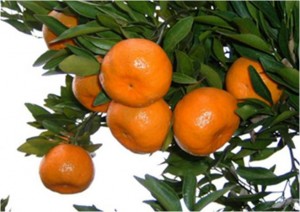Ponkan Tangerine Tree
Planting a citrus tree to a Tampa Bay home garden or landscaping project is an easy way to add some exotic flavor. The Ponkan Tangerine one of the oldest mandarin tangerines and will produce excellent fruit. The sweet juicy flesh and rich bright orange rind make it a distinctive and appealing citrus fruit. When it comes to enjoying the fruit it has some key advantages: there are few seeds, it has a loosely attached rind (easy to peel), and the segments are easily separated. They are also very cold hardy. The Keep It Green Nursery has a variety of tree sizes available from five to thirty gallons and all are registered for one year in the state of Florida.

| Name | Ponkan Tangerine, Chinese Honey Orange |
| Hardiness Zones | 8,9,10 |
| Flower Color | White |
| Blooms | Spring |
| Light Needs | Full Sun, Partial Sun |
| Water Needs | Average |
| Soil Needs | Moist, Well-Drained |
| Fruits | December to January |
| Seeds | Few, 3-7 |
| Size | 2-1/2″-3-1/2″ |
Care Information
The Ponkan Tangerine is similar to other citrus trees in its care needs. Juvenile trees will do best in temperatures between sixty and seventy degrees fahrenheit. Pruning trees in the early spring will encourage new growth. They will also need to be watered regularly but not too wet. Fertilize with good citrus fertilizer two times a year. The trees at Keep It Green Nursery are well prepared for success as they come from elite high end growers with high quality graft.
Design Ideas
The Ponkan Tangerine is an alternate bearer so every other year it will produce plentiful fruit. It is a medium sized upright tree and will grow vigorously. It is less cold resistant than other tangerines and is the most tropical of the mandarins. This is one of the best producing trees for convenient edible tangerines. Keep It Green Nursery has a variety of tree sizes that are best suited for permanent planting outdoors. The trees are treated, registered, state inspected and all are fruit bearing. They will grow from eight to twenty feet and need as much room around them. While they are smaller than some of the other citrus varieties they still require more room to accommodate their spreading crowns. Additionally, the Ponkan Tangerine tree will attract the North American giant swallowtail butterfly which uses it and other citrus trees for food in the larval stage.





